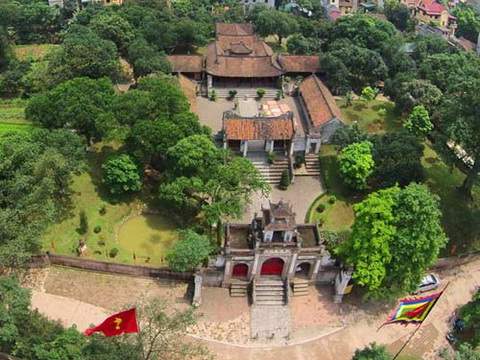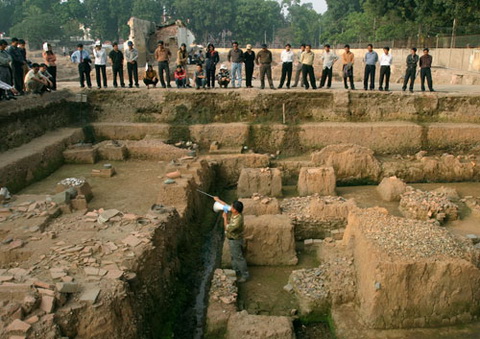Co Loa Citadel was built near Phong Khe, about 20 km to the north of today’s Hanoi, during the end of the Hong Bang Dynasty (about 257 BCE). The fortress is a spiral-shaped complex of the then new capital. The site was the source of various relics of the Dong Son culture of the Bronze Age.
According to folklore, An Duong Vuong defeated the last of the Hung Kings in 257 BCE and founded the kingdom of Au Lac, choosing the site of Co Loa as his capital.
Co Loa is a very large site and is the dominant presence in the northern floodplain of the Red River Delta, which would have required a large amount of labor and resources to have built in its time.
The archaeologists have exhibited many precious artifacts of the ancient Vietnamese people that were excavated Co Loa underground: Co Loa bronze drum, bronze coin, bronze axes, thousands of bronze arrows, plows, objects made of ceramic, terracotta, etc.
Every year, Co Loa festival is hold to commemorate King An Duong Vuong on 6th January (lunar calendar).
There are people from eight villages in Co Loa Commune meeting in the courtyard of Co Loa village house for offerings, expressing sincere heart for the king who had great merit in building and defending the country, just behind the Hung Kings.
Co Loa Citadel was built in a spiral – shaped type (hence called Loa citadel – a speaker shape citadel). According to the legend, the citadel has 9 walls, and is surrounded by deep moats which could let boats transfer easily.
Nowadays, there are only 3 earth walls left, with total length of 16 km: the Outer Wall with perimeter of 8km, the Middle Wall has polygonal shape and perimeter of 6.5 km and the Center Wall has rectangular shape, perimeter of 1.6 km.
It was said that long times ago, the wall was built up simultaneously with the ramparts and all three walls were surrounded by moats. Located at the eastward of the wall, the Main Lagoon has 5 streams with the purpose of bringing water into the Middle Wall and the Center Wall, created a closed circle for making comfortable and flexible infantry bases and sailor bases.
Today, the walls’ height is 4-5 meter on average, somewhere is up to 12 meters high, while the wall base is 20 ~ 30 meter wide.
At that time, the weapons used in the citadel were only swords, spears, bows and arrows, and the scale of Co Loa Citadel was very solid.
Co Loa Citadel is connected closely with miraculous and interesting legend of the Vietnamese, for example: An Duong Vuong King established its kingdom, constructed the Citadel; the magic crossbow gift from the golden turtle which can kill hundreds of invaders; the sorrowful love story between My Chau (Hung King’s daughter) and Trong Thuy (son of Trieu Da King – enemy of Hung King), etc. Throughout many dynasties, this ancient Citadel together with its historic figures has become a legend in every sub-conscious mind of Vietnamese people.
In the Co Loa historic Citadel Complex, the Thuong Temple (Thuc Phan An Duong Vuong Temple) is the most attractive visited point. It was built up in 1687 in Le Hi Tong King’s dynasty, on an old hill that once situated the King’s palace. In front of the temple there is a dragon stone which is carved very sophisticated, describing a pair of dragons stroking their moustaches vividly. Hence, it becomes the typical icon of sculpture art in Le dynasty.
Nowadays, Co Loa Citadel has not only been a cultural heritage but also a lively evidence of the creation, the technique skill as well as the ancient Vietnamese culture in their struggle of protecting Vietnam from its invaders, it also becomes the ideal destination for tourists all over the world who want to discover the cultural values, the familiar landscape of a peaceful northern village.
| The gate of An Duong Vuong Temple or Thuong Temple |


| Co Loa Citadel today |

| A statue inside the relic. |





| An Duong Vuong Temple |

| The ancient well of Co Loa Citadel |



| Co Loa communal house |

| The temple of Mi Chau princess |

| The statue of Mi Chau without the head |


| The statue of Cao Lo, who made the magic crossbow |

| Excavation at Co Loa citadel |













| Co Loa citadel festival |
Compiled by Pha Le / vietnamnet